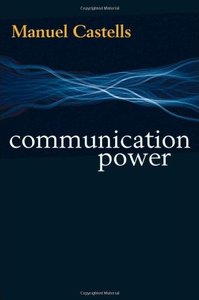 Zusammenfassungen
Zusammenfassungen
 We live in the midst of a revolution in communication technologies that affects the way in which people feel, think, and behave. The media have become the space where power strategies are played out. In the current technological context mass communication goes beyond traditional media and includes the Internet and mobile communication.
We live in the midst of a revolution in communication technologies that affects the way in which people feel, think, and behave. The media have become the space where power strategies are played out. In the current technological context mass communication goes beyond traditional media and includes the Internet and mobile communication.In this wide-ranging and powerful book, Manuel Castells analyses the transformation of the global media industry by this revolution in communication technologies. He argues that a new communication system, mass self-communication, has emerged, and power relationships have been profoundly modified by the emergence of this new communication environment. Created in the commons of the Internet this communication can be locally based, but globally connected. It is built through messaging, social networks sites, and blogging, and is now being used by the millions around the world who have access to the Internet.
Drawing on a wide range of social and psychological theories, Castells presents original research on political processes and social movements. He applies this analysis to numerous recent events--the misinformation of the American public on the Iraq War, the global environmental movement to prevent climate change, the control of information in China and Russia, Barak Obama's internet-based presidential campaigns, and (in this new edition) responses to recent political and economic crises such as the Arab Spring and the Occupy movement. On the basis of these case studies he proposes a new theory of power in the information age based on the management of communication networks
Justly celebrated for his analysis of the network society, Castells here builds on that work, offering a well grounded and immensely challenging picture of communication and power in the 21st century. This is a book for anyone who wants to understand the dynamics and character of the modern world.
 Dieses Buch erwähnt ...
Dieses Buch erwähnt ...
 Dieses Buch erwähnt vermutlich nicht ...
Dieses Buch erwähnt vermutlich nicht ... 
 Nicht erwähnte Begriffe | Weblogs in education |
 Zitationsgraph
Zitationsgraph
 Zitationsgraph (Beta-Test mit vis.js)
Zitationsgraph (Beta-Test mit vis.js)
 Zeitleiste
Zeitleiste
 18 Erwähnungen
18 Erwähnungen 
- Theories of the Information Society - 4th Edition (Frank Webster) (1995)

- The Semantic Sphere - Computation, Cognition and Information Economy (Pierre Lévy) (2011)


- User Experience in benutzergenerierten, digitalen Lernumgebungen - Gestaltungsspielräume für globale Bildung (Anja Wagner) (2012)


- Digital Disconnect - How Capitalism is Turning the Internet Against Democracy (Robert McChesney) (2013)

- 1. What Is the Elephant in the Digital Room?
- The Culture of Connectivity (José van Dijck) (2013)

- The Future of the Curriculum - School Knowledge in the Digital Age (Ben Williamson) (2013)

- The Politics of Education and Technology - Conflicts, Controversies, and Connections (2013)

- it's complicated - the social lives of networked teens (danah boyd) (2014)


- Digital Sociology (Deborah Lupton) (2015)

- Redefreiheit - Prinzipien für eine vernetzte Welt (Timothy Garton Ash) (2016)

- Big Data in Education - The digital future of learning, policy and practice (Ben Williamson) (2017)

- Bildung und Öffentlichkeit - Eine strukturtheoretische Perspektive auf Bildung im Horizont digitaler Medialität (Dan Verständig) (2017)


- Praktiken der Überwachten - Öffentlichkeit und Privatheit im Web 2.0 (Martin Stempfhuber, Elke Wagner) (2018)


- Optimierung in der Medienpädagogik (Patrick Bettinger, Klaus Rummler, Karsten D. Wolf) (2021)
- Zwischen Optimierung und ludischen Gegenstrategien - Ästhetische Praktiken von Jugendlichen an der Social Media Schnittstelle (Viktoria Flasche, Anna Carnap)


- Zwischen Optimierung und ludischen Gegenstrategien - Ästhetische Praktiken von Jugendlichen an der Social Media Schnittstelle (Viktoria Flasche, Anna Carnap)
- New Perspectives in Critical Data Studies - The Ambivalences of Data Power (Andreas Hepp, Juliane Jarke, Leif Kramp) (2022)


- Data Power and Counter-power with Chinese Characteristics (Jack Linchuan Qiu)


- Data Power and Counter-power with Chinese Characteristics (Jack Linchuan Qiu)
- Kommunizieren und Herrschen - Zur Genealogie des Regierens in der digitalen Gesellschaft (Janosik Herder) (2023)


- Populismus und Protest - Demokratische Öffentlichkeiten und Medienbildung in Zeiten von Rechtsextremismus und Digitalisierung (Sabrina Schenk) (2024)


- Programmierter Protest? - Ausdrucksformen des Widerstands im digitalen Zeitalter (Juliane Ahlborn, Dan Verständig)

- Programmierter Protest? - Ausdrucksformen des Widerstands im digitalen Zeitalter (Juliane Ahlborn, Dan Verständig)
- Kompetenzen kommunikativen Handelns im Kontext mediatisierter Digitalität (Ann-Kathrin Watolla) (2024)


 Co-zitierte Bücher
Co-zitierte Bücher

The Age of Discontinuity
(Peter Drucker) (1969)
Bowling alone
(Robert Putnam) (2000)

No Sense of Place
The Impact of Electronic Media on Social Behaviour
(Joshua Meyrowitz) (1985)

Confronting the Challenges of Participatory Culture
Media Education for the 21st Century
(Henry Jenkins, Katie Clinton, Ravi Purushotma, Alice J. Robison, Margaret Weigel) (2006)



Der Aufstieg der Netzwerkgesellschaft
The Rise of the Network Society
The Information Age: Economy, Society, and Culture, Volume 1
(Manuel Castells) (1996)

Elemente einer kritischen Internetkultur
Zero Comments
Blogging and Critical Internet Culture
(Geert Lovink) (2007)

How blogs, MySpace, YouTube, and the rest of today's user-generated media are destroying our economy, our culture, and our values
(Andrew Keen) (2008)

 Volltext dieses Dokuments
Volltext dieses Dokuments
 Bibliographisches
Bibliographisches 
 Beat und dieses Buch
Beat und dieses Buch
Beat hat dieses Buch während seiner Zeit am Institut für Medien und Schule (IMS) ins Biblionetz aufgenommen. Beat besitzt kein physisches, aber ein digitales Exemplar. (das er aber aus Urheberrechtsgründen nicht einfach weitergeben darf).











 China
China Gesellschaft
Gesellschaft Internet
Internet Kommunikation
Kommunikation Weblogs
Weblogs








































 , 2051 kByte)
, 2051 kByte) 



 Biblionetz-History
Biblionetz-History